Theories, Principles, and Models in Education & Training-Report
VerifiedAdded on 2023/06/09
|17
|5899
|85
Report
AI Summary
This report provides an in-depth analysis of various theories, principles, and models in education and training, with a focus on their practical application in teaching and learning environments, particularly within the context of the University of Manchester. It covers learning theories such as Gagne's Skill Development theory, principles of effective learning, and models for understanding learning preferences like Gardner’s multiple intelligence theory and Honey and Mumford's learning styles. The report also examines communication theories and their impact on teaching, learning, and assessment, along with theories and models of assessment and curriculum development, emphasizing their role in enhancing teaching practices. Furthermore, it explores models of reflection and evaluation, highlighting their importance in reviewing and improving one's own teaching practice. The overall aim is to provide a comprehensive understanding of theoretical frameworks that can guide and improve the educational process.

Theories, principles
and Models in the
Education and
training.
and Models in the
Education and
training.
Paraphrase This Document
Need a fresh take? Get an instant paraphrase of this document with our AI Paraphraser
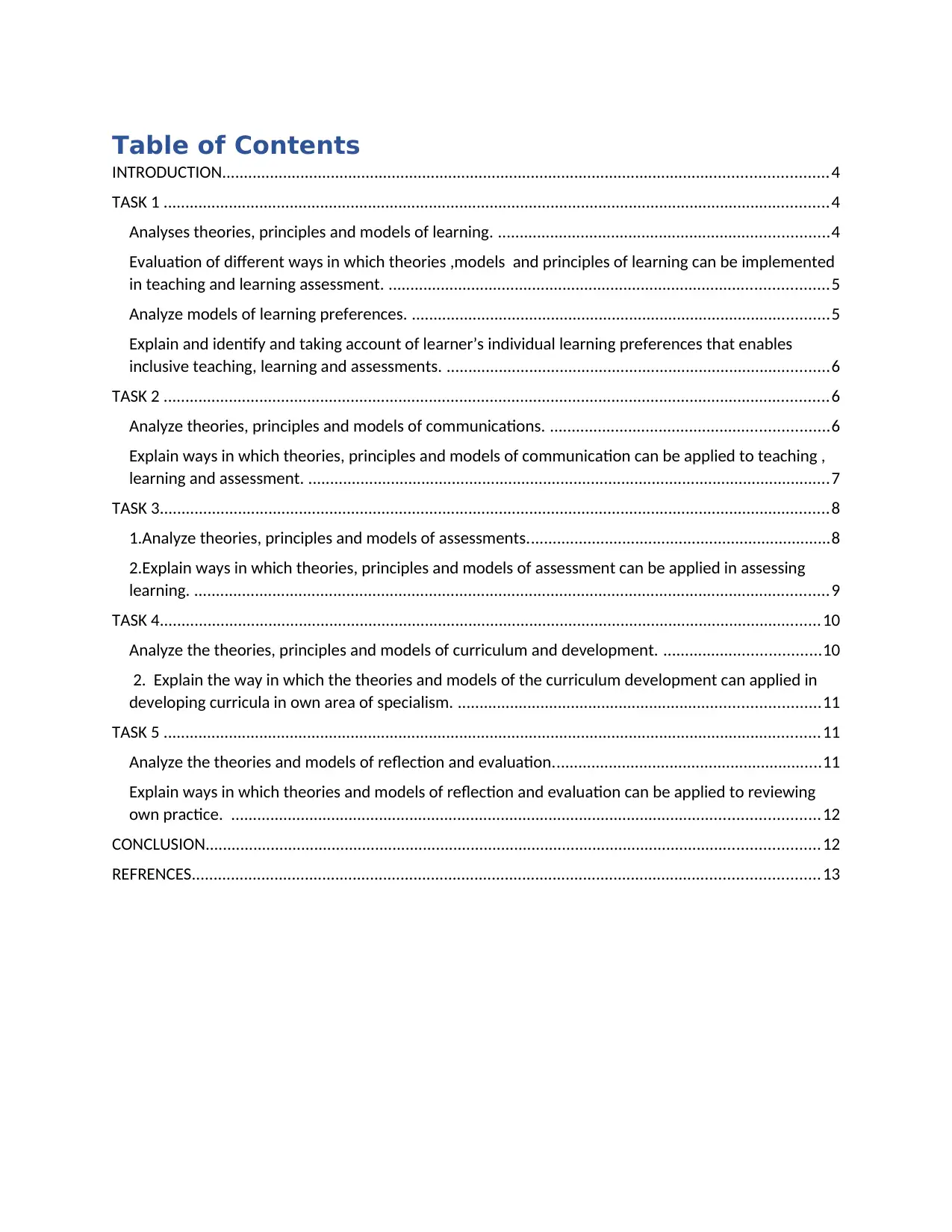
Table of Contents
INTRODUCTION...........................................................................................................................................4
TASK 1 .........................................................................................................................................................4
Analyses theories, principles and models of learning. ............................................................................4
Evaluation of different ways in which theories ,models and principles of learning can be implemented
in teaching and learning assessment. .....................................................................................................5
Analyze models of learning preferences. ................................................................................................5
Explain and identify and taking account of learner’s individual learning preferences that enables
inclusive teaching, learning and assessments. ........................................................................................6
TASK 2 .........................................................................................................................................................6
Analyze theories, principles and models of communications. ................................................................6
Explain ways in which theories, principles and models of communication can be applied to teaching ,
learning and assessment. ........................................................................................................................7
TASK 3..........................................................................................................................................................8
1.Analyze theories, principles and models of assessments......................................................................8
2.Explain ways in which theories, principles and models of assessment can be applied in assessing
learning. ..................................................................................................................................................9
TASK 4........................................................................................................................................................10
Analyze the theories, principles and models of curriculum and development. ....................................10
2. Explain the way in which the theories and models of the curriculum development can applied in
developing curricula in own area of specialism. ...................................................................................11
TASK 5 .......................................................................................................................................................11
Analyze the theories and models of reflection and evaluation..............................................................11
Explain ways in which theories and models of reflection and evaluation can be applied to reviewing
own practice. .......................................................................................................................................12
CONCLUSION.............................................................................................................................................12
REFRENCES................................................................................................................................................13
INTRODUCTION...........................................................................................................................................4
TASK 1 .........................................................................................................................................................4
Analyses theories, principles and models of learning. ............................................................................4
Evaluation of different ways in which theories ,models and principles of learning can be implemented
in teaching and learning assessment. .....................................................................................................5
Analyze models of learning preferences. ................................................................................................5
Explain and identify and taking account of learner’s individual learning preferences that enables
inclusive teaching, learning and assessments. ........................................................................................6
TASK 2 .........................................................................................................................................................6
Analyze theories, principles and models of communications. ................................................................6
Explain ways in which theories, principles and models of communication can be applied to teaching ,
learning and assessment. ........................................................................................................................7
TASK 3..........................................................................................................................................................8
1.Analyze theories, principles and models of assessments......................................................................8
2.Explain ways in which theories, principles and models of assessment can be applied in assessing
learning. ..................................................................................................................................................9
TASK 4........................................................................................................................................................10
Analyze the theories, principles and models of curriculum and development. ....................................10
2. Explain the way in which the theories and models of the curriculum development can applied in
developing curricula in own area of specialism. ...................................................................................11
TASK 5 .......................................................................................................................................................11
Analyze the theories and models of reflection and evaluation..............................................................11
Explain ways in which theories and models of reflection and evaluation can be applied to reviewing
own practice. .......................................................................................................................................12
CONCLUSION.............................................................................................................................................12
REFRENCES................................................................................................................................................13
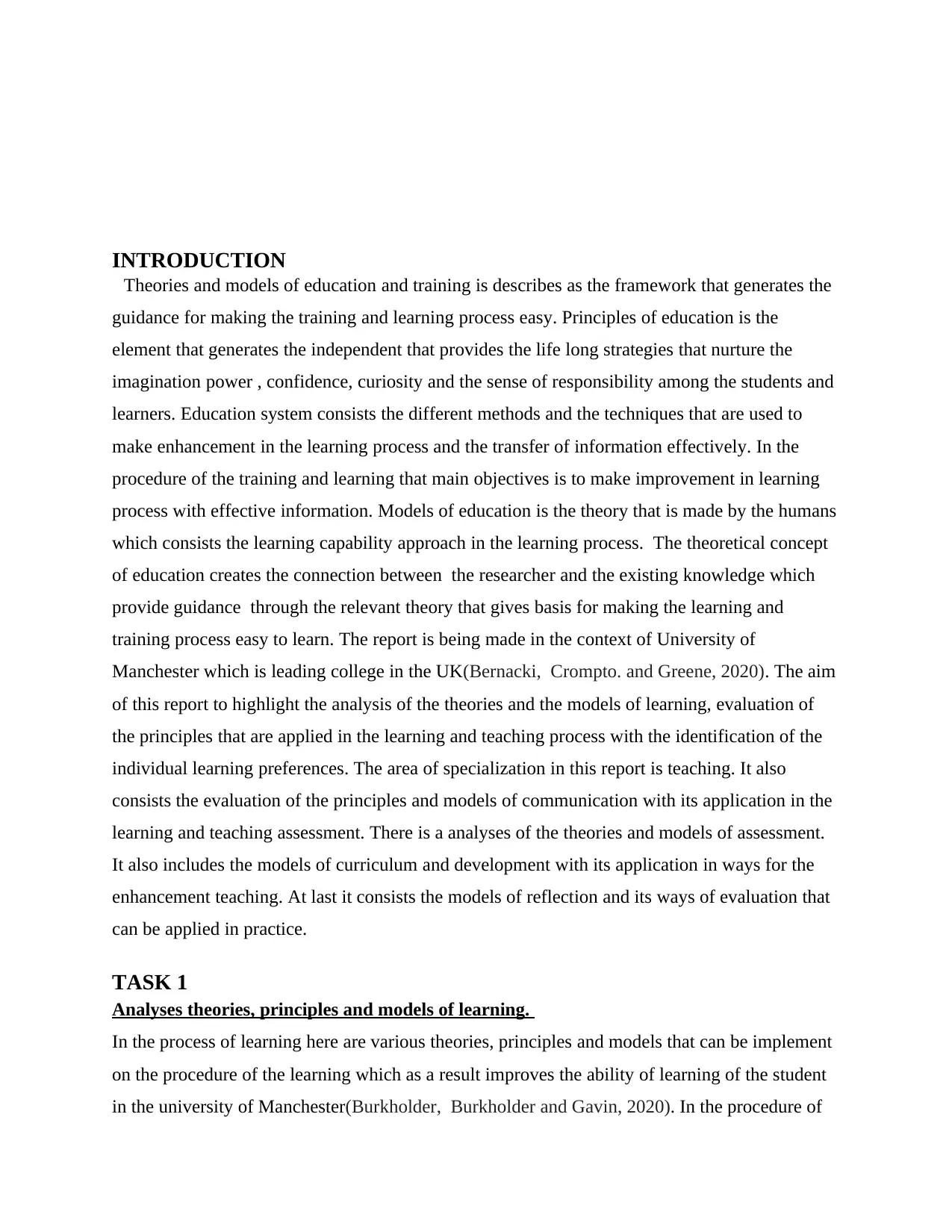
INTRODUCTION
Theories and models of education and training is describes as the framework that generates the
guidance for making the training and learning process easy. Principles of education is the
element that generates the independent that provides the life long strategies that nurture the
imagination power , confidence, curiosity and the sense of responsibility among the students and
learners. Education system consists the different methods and the techniques that are used to
make enhancement in the learning process and the transfer of information effectively. In the
procedure of the training and learning that main objectives is to make improvement in learning
process with effective information. Models of education is the theory that is made by the humans
which consists the learning capability approach in the learning process. The theoretical concept
of education creates the connection between the researcher and the existing knowledge which
provide guidance through the relevant theory that gives basis for making the learning and
training process easy to learn. The report is being made in the context of University of
Manchester which is leading college in the UK(Bernacki, Crompto. and Greene, 2020). The aim
of this report to highlight the analysis of the theories and the models of learning, evaluation of
the principles that are applied in the learning and teaching process with the identification of the
individual learning preferences. The area of specialization in this report is teaching. It also
consists the evaluation of the principles and models of communication with its application in the
learning and teaching assessment. There is a analyses of the theories and models of assessment.
It also includes the models of curriculum and development with its application in ways for the
enhancement teaching. At last it consists the models of reflection and its ways of evaluation that
can be applied in practice.
TASK 1
Analyses theories, principles and models of learning.
In the process of learning here are various theories, principles and models that can be implement
on the procedure of the learning which as a result improves the ability of learning of the student
in the university of Manchester(Burkholder, Burkholder and Gavin, 2020). In the procedure of
Theories and models of education and training is describes as the framework that generates the
guidance for making the training and learning process easy. Principles of education is the
element that generates the independent that provides the life long strategies that nurture the
imagination power , confidence, curiosity and the sense of responsibility among the students and
learners. Education system consists the different methods and the techniques that are used to
make enhancement in the learning process and the transfer of information effectively. In the
procedure of the training and learning that main objectives is to make improvement in learning
process with effective information. Models of education is the theory that is made by the humans
which consists the learning capability approach in the learning process. The theoretical concept
of education creates the connection between the researcher and the existing knowledge which
provide guidance through the relevant theory that gives basis for making the learning and
training process easy to learn. The report is being made in the context of University of
Manchester which is leading college in the UK(Bernacki, Crompto. and Greene, 2020). The aim
of this report to highlight the analysis of the theories and the models of learning, evaluation of
the principles that are applied in the learning and teaching process with the identification of the
individual learning preferences. The area of specialization in this report is teaching. It also
consists the evaluation of the principles and models of communication with its application in the
learning and teaching assessment. There is a analyses of the theories and models of assessment.
It also includes the models of curriculum and development with its application in ways for the
enhancement teaching. At last it consists the models of reflection and its ways of evaluation that
can be applied in practice.
TASK 1
Analyses theories, principles and models of learning.
In the process of learning here are various theories, principles and models that can be implement
on the procedure of the learning which as a result improves the ability of learning of the student
in the university of Manchester(Burkholder, Burkholder and Gavin, 2020). In the procedure of
⊘ This is a preview!⊘
Do you want full access?
Subscribe today to unlock all pages.

Trusted by 1+ million students worldwide
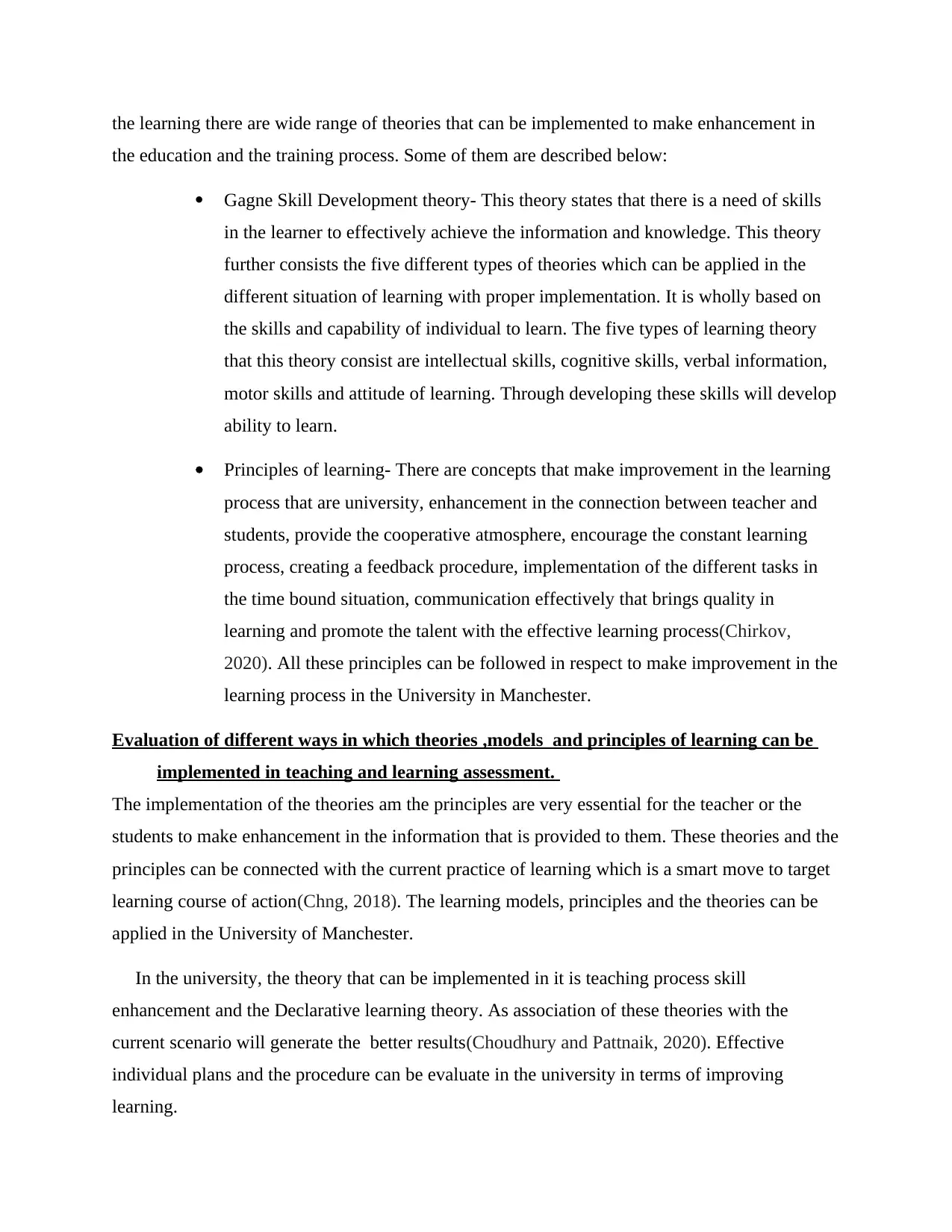
the learning there are wide range of theories that can be implemented to make enhancement in
the education and the training process. Some of them are described below:
Gagne Skill Development theory- This theory states that there is a need of skills
in the learner to effectively achieve the information and knowledge. This theory
further consists the five different types of theories which can be applied in the
different situation of learning with proper implementation. It is wholly based on
the skills and capability of individual to learn. The five types of learning theory
that this theory consist are intellectual skills, cognitive skills, verbal information,
motor skills and attitude of learning. Through developing these skills will develop
ability to learn.
Principles of learning- There are concepts that make improvement in the learning
process that are university, enhancement in the connection between teacher and
students, provide the cooperative atmosphere, encourage the constant learning
process, creating a feedback procedure, implementation of the different tasks in
the time bound situation, communication effectively that brings quality in
learning and promote the talent with the effective learning process(Chirkov,
2020). All these principles can be followed in respect to make improvement in the
learning process in the University in Manchester.
Evaluation of different ways in which theories ,models and principles of learning can be
implemented in teaching and learning assessment.
The implementation of the theories am the principles are very essential for the teacher or the
students to make enhancement in the information that is provided to them. These theories and the
principles can be connected with the current practice of learning which is a smart move to target
learning course of action(Chng, 2018). The learning models, principles and the theories can be
applied in the University of Manchester.
In the university, the theory that can be implemented in it is teaching process skill
enhancement and the Declarative learning theory. As association of these theories with the
current scenario will generate the better results(Choudhury and Pattnaik, 2020). Effective
individual plans and the procedure can be evaluate in the university in terms of improving
learning.
the education and the training process. Some of them are described below:
Gagne Skill Development theory- This theory states that there is a need of skills
in the learner to effectively achieve the information and knowledge. This theory
further consists the five different types of theories which can be applied in the
different situation of learning with proper implementation. It is wholly based on
the skills and capability of individual to learn. The five types of learning theory
that this theory consist are intellectual skills, cognitive skills, verbal information,
motor skills and attitude of learning. Through developing these skills will develop
ability to learn.
Principles of learning- There are concepts that make improvement in the learning
process that are university, enhancement in the connection between teacher and
students, provide the cooperative atmosphere, encourage the constant learning
process, creating a feedback procedure, implementation of the different tasks in
the time bound situation, communication effectively that brings quality in
learning and promote the talent with the effective learning process(Chirkov,
2020). All these principles can be followed in respect to make improvement in the
learning process in the University in Manchester.
Evaluation of different ways in which theories ,models and principles of learning can be
implemented in teaching and learning assessment.
The implementation of the theories am the principles are very essential for the teacher or the
students to make enhancement in the information that is provided to them. These theories and the
principles can be connected with the current practice of learning which is a smart move to target
learning course of action(Chng, 2018). The learning models, principles and the theories can be
applied in the University of Manchester.
In the university, the theory that can be implemented in it is teaching process skill
enhancement and the Declarative learning theory. As association of these theories with the
current scenario will generate the better results(Choudhury and Pattnaik, 2020). Effective
individual plans and the procedure can be evaluate in the university in terms of improving
learning.
Paraphrase This Document
Need a fresh take? Get an instant paraphrase of this document with our AI Paraphraser
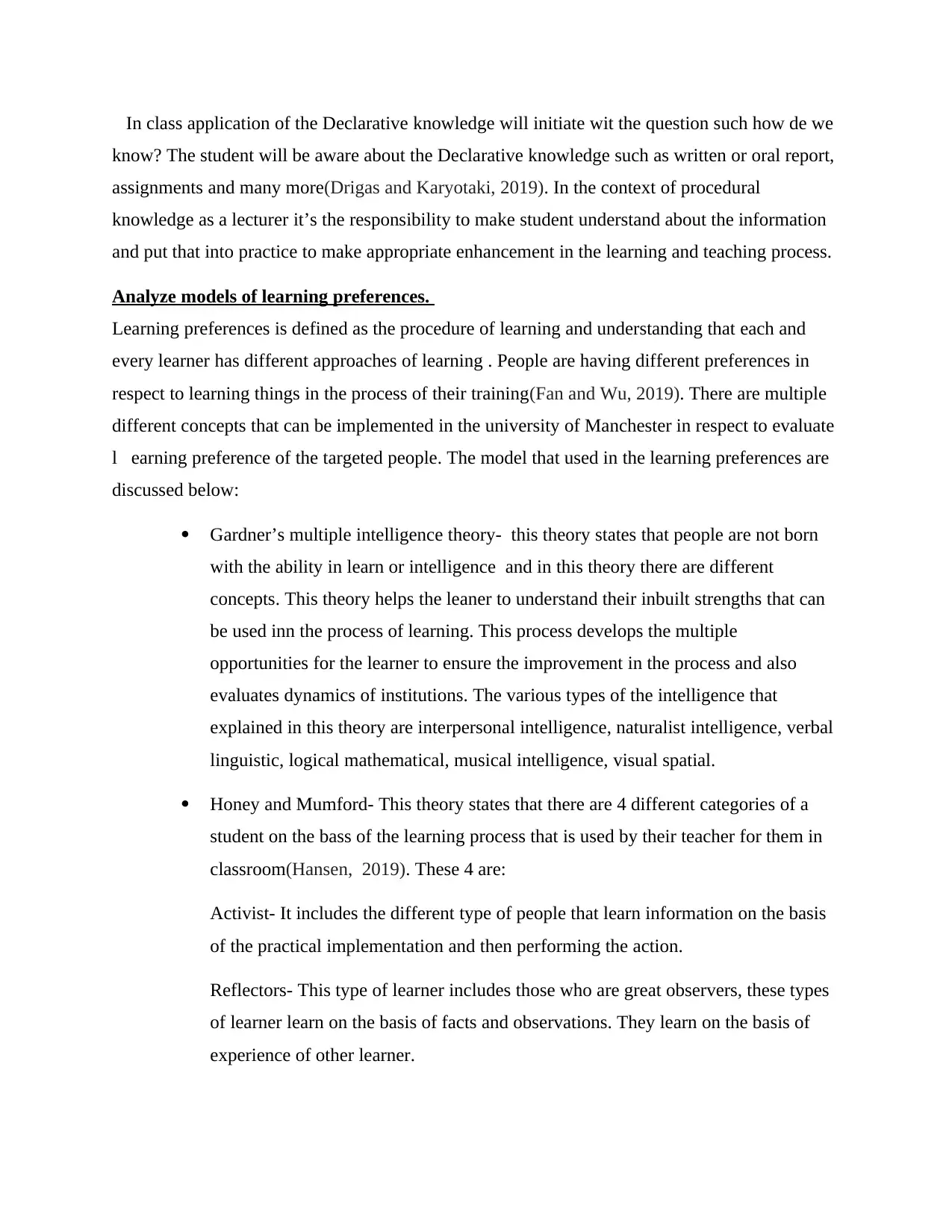
In class application of the Declarative knowledge will initiate wit the question such how de we
know? The student will be aware about the Declarative knowledge such as written or oral report,
assignments and many more(Drigas and Karyotaki, 2019). In the context of procedural
knowledge as a lecturer it’s the responsibility to make student understand about the information
and put that into practice to make appropriate enhancement in the learning and teaching process.
Analyze models of learning preferences.
Learning preferences is defined as the procedure of learning and understanding that each and
every learner has different approaches of learning . People are having different preferences in
respect to learning things in the process of their training(Fan and Wu, 2019). There are multiple
different concepts that can be implemented in the university of Manchester in respect to evaluate
l earning preference of the targeted people. The model that used in the learning preferences are
discussed below:
Gardner’s multiple intelligence theory- this theory states that people are not born
with the ability in learn or intelligence and in this theory there are different
concepts. This theory helps the leaner to understand their inbuilt strengths that can
be used inn the process of learning. This process develops the multiple
opportunities for the learner to ensure the improvement in the process and also
evaluates dynamics of institutions. The various types of the intelligence that
explained in this theory are interpersonal intelligence, naturalist intelligence, verbal
linguistic, logical mathematical, musical intelligence, visual spatial.
Honey and Mumford- This theory states that there are 4 different categories of a
student on the bass of the learning process that is used by their teacher for them in
classroom(Hansen, 2019). These 4 are:
Activist- It includes the different type of people that learn information on the basis
of the practical implementation and then performing the action.
Reflectors- This type of learner includes those who are great observers, these types
of learner learn on the basis of facts and observations. They learn on the basis of
experience of other learner.
know? The student will be aware about the Declarative knowledge such as written or oral report,
assignments and many more(Drigas and Karyotaki, 2019). In the context of procedural
knowledge as a lecturer it’s the responsibility to make student understand about the information
and put that into practice to make appropriate enhancement in the learning and teaching process.
Analyze models of learning preferences.
Learning preferences is defined as the procedure of learning and understanding that each and
every learner has different approaches of learning . People are having different preferences in
respect to learning things in the process of their training(Fan and Wu, 2019). There are multiple
different concepts that can be implemented in the university of Manchester in respect to evaluate
l earning preference of the targeted people. The model that used in the learning preferences are
discussed below:
Gardner’s multiple intelligence theory- this theory states that people are not born
with the ability in learn or intelligence and in this theory there are different
concepts. This theory helps the leaner to understand their inbuilt strengths that can
be used inn the process of learning. This process develops the multiple
opportunities for the learner to ensure the improvement in the process and also
evaluates dynamics of institutions. The various types of the intelligence that
explained in this theory are interpersonal intelligence, naturalist intelligence, verbal
linguistic, logical mathematical, musical intelligence, visual spatial.
Honey and Mumford- This theory states that there are 4 different categories of a
student on the bass of the learning process that is used by their teacher for them in
classroom(Hansen, 2019). These 4 are:
Activist- It includes the different type of people that learn information on the basis
of the practical implementation and then performing the action.
Reflectors- This type of learner includes those who are great observers, these types
of learner learn on the basis of facts and observations. They learn on the basis of
experience of other learner.
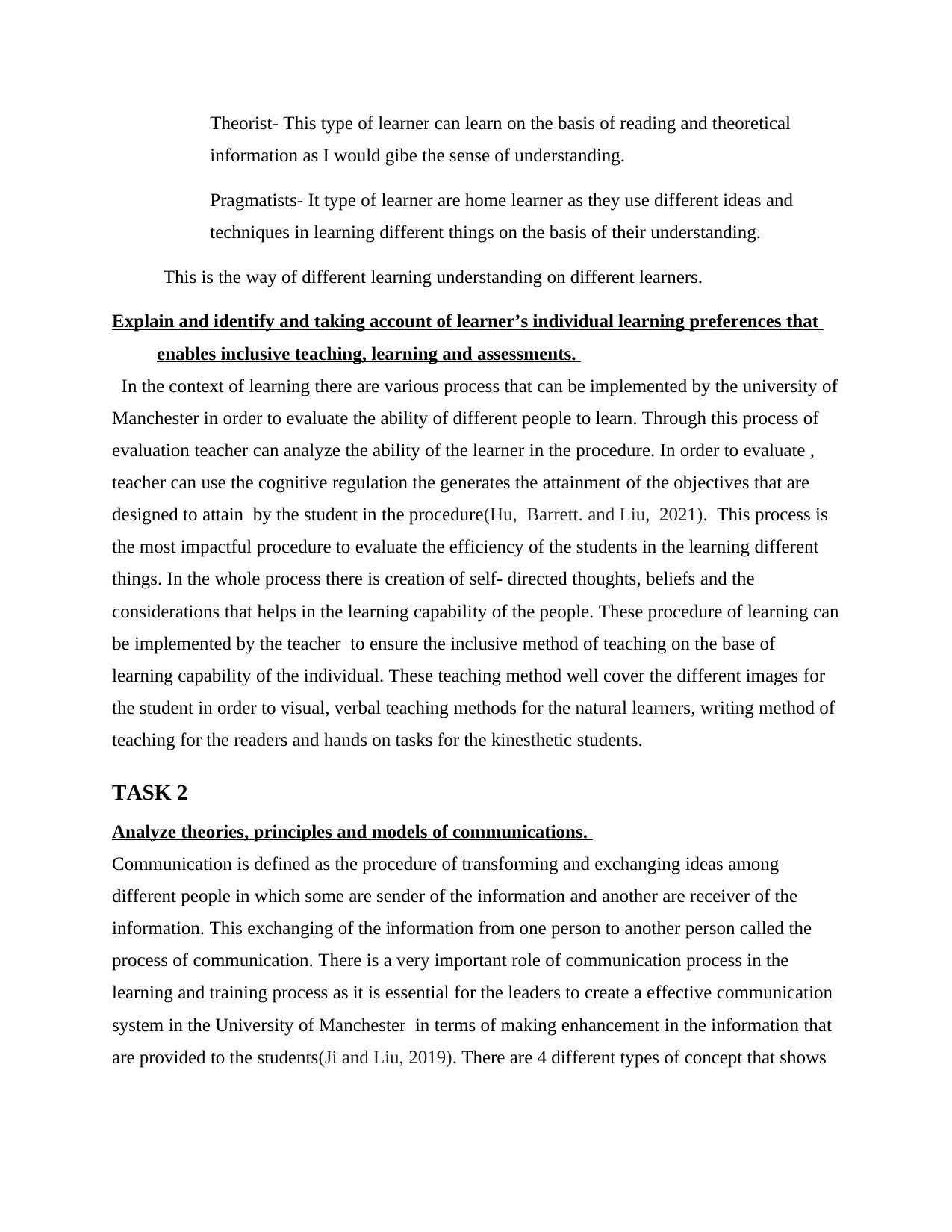
Theorist- This type of learner can learn on the basis of reading and theoretical
information as I would gibe the sense of understanding.
Pragmatists- It type of learner are home learner as they use different ideas and
techniques in learning different things on the basis of their understanding.
This is the way of different learning understanding on different learners.
Explain and identify and taking account of learner’s individual learning preferences that
enables inclusive teaching, learning and assessments.
In the context of learning there are various process that can be implemented by the university of
Manchester in order to evaluate the ability of different people to learn. Through this process of
evaluation teacher can analyze the ability of the learner in the procedure. In order to evaluate ,
teacher can use the cognitive regulation the generates the attainment of the objectives that are
designed to attain by the student in the procedure(Hu, Barrett. and Liu, 2021). This process is
the most impactful procedure to evaluate the efficiency of the students in the learning different
things. In the whole process there is creation of self- directed thoughts, beliefs and the
considerations that helps in the learning capability of the people. These procedure of learning can
be implemented by the teacher to ensure the inclusive method of teaching on the base of
learning capability of the individual. These teaching method well cover the different images for
the student in order to visual, verbal teaching methods for the natural learners, writing method of
teaching for the readers and hands on tasks for the kinesthetic students.
TASK 2
Analyze theories, principles and models of communications.
Communication is defined as the procedure of transforming and exchanging ideas among
different people in which some are sender of the information and another are receiver of the
information. This exchanging of the information from one person to another person called the
process of communication. There is a very important role of communication process in the
learning and training process as it is essential for the leaders to create a effective communication
system in the University of Manchester in terms of making enhancement in the information that
are provided to the students(Ji and Liu, 2019). There are 4 different types of concept that shows
information as I would gibe the sense of understanding.
Pragmatists- It type of learner are home learner as they use different ideas and
techniques in learning different things on the basis of their understanding.
This is the way of different learning understanding on different learners.
Explain and identify and taking account of learner’s individual learning preferences that
enables inclusive teaching, learning and assessments.
In the context of learning there are various process that can be implemented by the university of
Manchester in order to evaluate the ability of different people to learn. Through this process of
evaluation teacher can analyze the ability of the learner in the procedure. In order to evaluate ,
teacher can use the cognitive regulation the generates the attainment of the objectives that are
designed to attain by the student in the procedure(Hu, Barrett. and Liu, 2021). This process is
the most impactful procedure to evaluate the efficiency of the students in the learning different
things. In the whole process there is creation of self- directed thoughts, beliefs and the
considerations that helps in the learning capability of the people. These procedure of learning can
be implemented by the teacher to ensure the inclusive method of teaching on the base of
learning capability of the individual. These teaching method well cover the different images for
the student in order to visual, verbal teaching methods for the natural learners, writing method of
teaching for the readers and hands on tasks for the kinesthetic students.
TASK 2
Analyze theories, principles and models of communications.
Communication is defined as the procedure of transforming and exchanging ideas among
different people in which some are sender of the information and another are receiver of the
information. This exchanging of the information from one person to another person called the
process of communication. There is a very important role of communication process in the
learning and training process as it is essential for the leaders to create a effective communication
system in the University of Manchester in terms of making enhancement in the information that
are provided to the students(Ji and Liu, 2019). There are 4 different types of concept that shows
⊘ This is a preview!⊘
Do you want full access?
Subscribe today to unlock all pages.

Trusted by 1+ million students worldwide
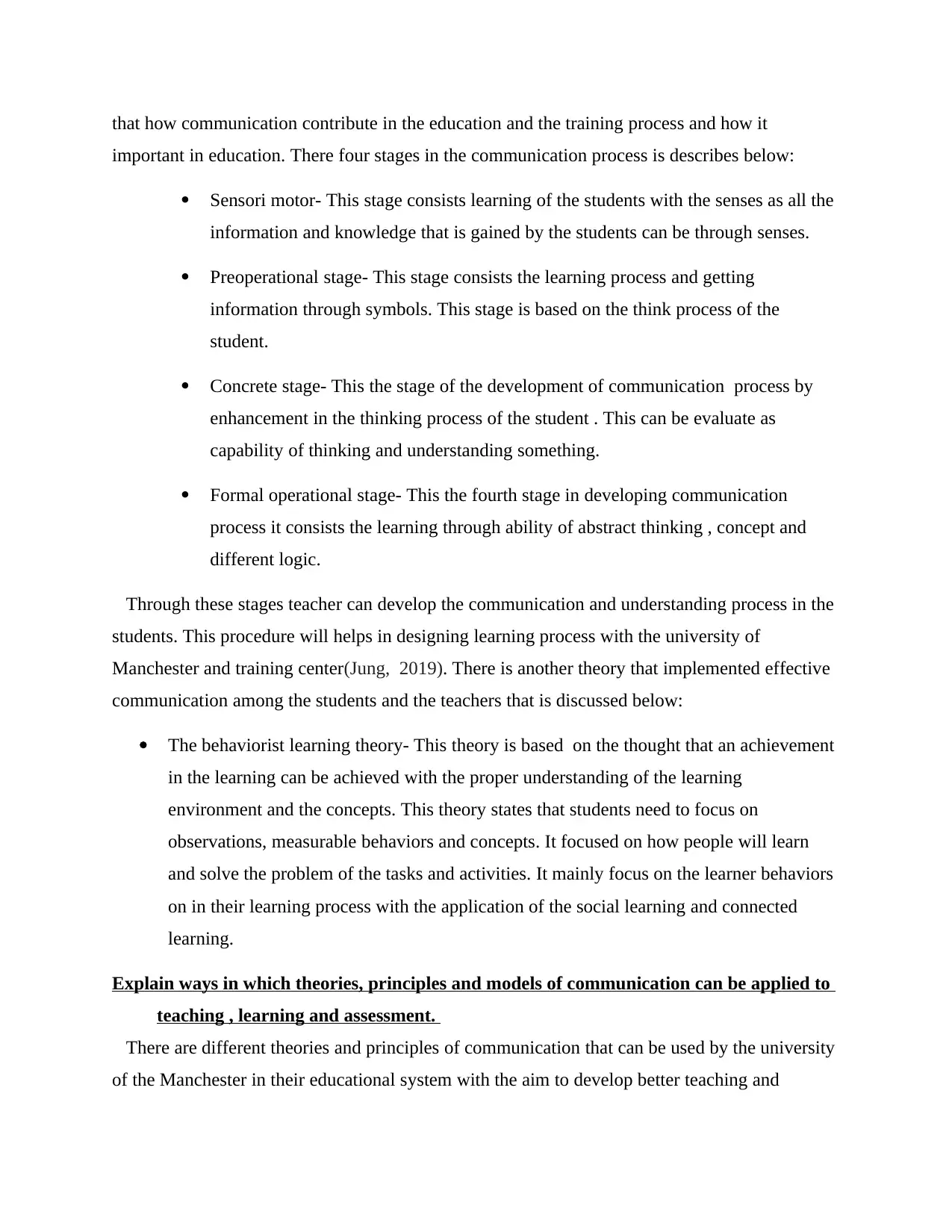
that how communication contribute in the education and the training process and how it
important in education. There four stages in the communication process is describes below:
Sensori motor- This stage consists learning of the students with the senses as all the
information and knowledge that is gained by the students can be through senses.
Preoperational stage- This stage consists the learning process and getting
information through symbols. This stage is based on the think process of the
student.
Concrete stage- This the stage of the development of communication process by
enhancement in the thinking process of the student . This can be evaluate as
capability of thinking and understanding something.
Formal operational stage- This the fourth stage in developing communication
process it consists the learning through ability of abstract thinking , concept and
different logic.
Through these stages teacher can develop the communication and understanding process in the
students. This procedure will helps in designing learning process with the university of
Manchester and training center(Jung, 2019). There is another theory that implemented effective
communication among the students and the teachers that is discussed below:
The behaviorist learning theory- This theory is based on the thought that an achievement
in the learning can be achieved with the proper understanding of the learning
environment and the concepts. This theory states that students need to focus on
observations, measurable behaviors and concepts. It focused on how people will learn
and solve the problem of the tasks and activities. It mainly focus on the learner behaviors
on in their learning process with the application of the social learning and connected
learning.
Explain ways in which theories, principles and models of communication can be applied to
teaching , learning and assessment.
There are different theories and principles of communication that can be used by the university
of the Manchester in their educational system with the aim to develop better teaching and
important in education. There four stages in the communication process is describes below:
Sensori motor- This stage consists learning of the students with the senses as all the
information and knowledge that is gained by the students can be through senses.
Preoperational stage- This stage consists the learning process and getting
information through symbols. This stage is based on the think process of the
student.
Concrete stage- This the stage of the development of communication process by
enhancement in the thinking process of the student . This can be evaluate as
capability of thinking and understanding something.
Formal operational stage- This the fourth stage in developing communication
process it consists the learning through ability of abstract thinking , concept and
different logic.
Through these stages teacher can develop the communication and understanding process in the
students. This procedure will helps in designing learning process with the university of
Manchester and training center(Jung, 2019). There is another theory that implemented effective
communication among the students and the teachers that is discussed below:
The behaviorist learning theory- This theory is based on the thought that an achievement
in the learning can be achieved with the proper understanding of the learning
environment and the concepts. This theory states that students need to focus on
observations, measurable behaviors and concepts. It focused on how people will learn
and solve the problem of the tasks and activities. It mainly focus on the learner behaviors
on in their learning process with the application of the social learning and connected
learning.
Explain ways in which theories, principles and models of communication can be applied to
teaching , learning and assessment.
There are different theories and principles of communication that can be used by the university
of the Manchester in their educational system with the aim to develop better teaching and
Paraphrase This Document
Need a fresh take? Get an instant paraphrase of this document with our AI Paraphraser
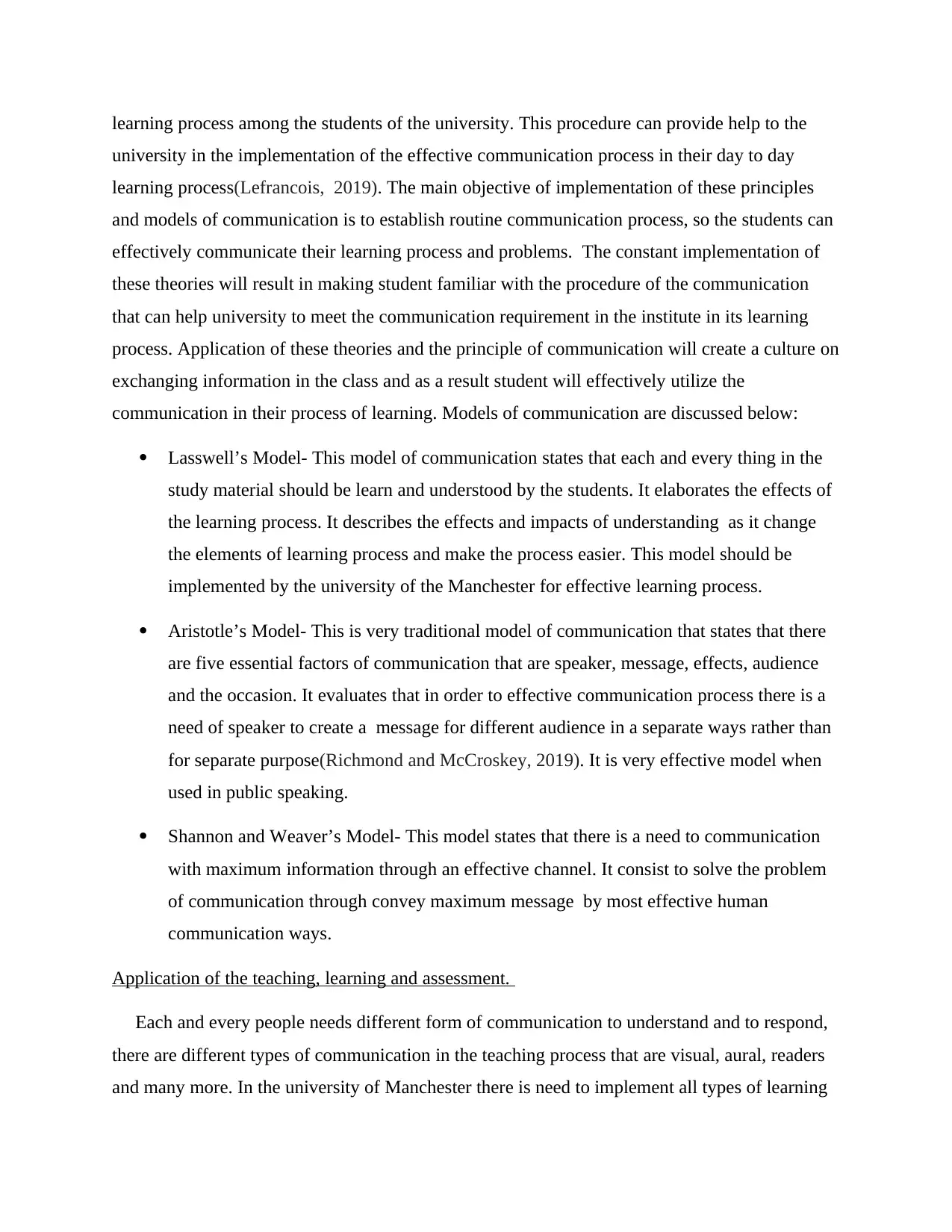
learning process among the students of the university. This procedure can provide help to the
university in the implementation of the effective communication process in their day to day
learning process(Lefrancois, 2019). The main objective of implementation of these principles
and models of communication is to establish routine communication process, so the students can
effectively communicate their learning process and problems. The constant implementation of
these theories will result in making student familiar with the procedure of the communication
that can help university to meet the communication requirement in the institute in its learning
process. Application of these theories and the principle of communication will create a culture on
exchanging information in the class and as a result student will effectively utilize the
communication in their process of learning. Models of communication are discussed below:
Lasswell’s Model- This model of communication states that each and every thing in the
study material should be learn and understood by the students. It elaborates the effects of
the learning process. It describes the effects and impacts of understanding as it change
the elements of learning process and make the process easier. This model should be
implemented by the university of the Manchester for effective learning process.
Aristotle’s Model- This is very traditional model of communication that states that there
are five essential factors of communication that are speaker, message, effects, audience
and the occasion. It evaluates that in order to effective communication process there is a
need of speaker to create a message for different audience in a separate ways rather than
for separate purpose(Richmond and McCroskey, 2019). It is very effective model when
used in public speaking.
Shannon and Weaver’s Model- This model states that there is a need to communication
with maximum information through an effective channel. It consist to solve the problem
of communication through convey maximum message by most effective human
communication ways.
Application of the teaching, learning and assessment.
Each and every people needs different form of communication to understand and to respond,
there are different types of communication in the teaching process that are visual, aural, readers
and many more. In the university of Manchester there is need to implement all types of learning
university in the implementation of the effective communication process in their day to day
learning process(Lefrancois, 2019). The main objective of implementation of these principles
and models of communication is to establish routine communication process, so the students can
effectively communicate their learning process and problems. The constant implementation of
these theories will result in making student familiar with the procedure of the communication
that can help university to meet the communication requirement in the institute in its learning
process. Application of these theories and the principle of communication will create a culture on
exchanging information in the class and as a result student will effectively utilize the
communication in their process of learning. Models of communication are discussed below:
Lasswell’s Model- This model of communication states that each and every thing in the
study material should be learn and understood by the students. It elaborates the effects of
the learning process. It describes the effects and impacts of understanding as it change
the elements of learning process and make the process easier. This model should be
implemented by the university of the Manchester for effective learning process.
Aristotle’s Model- This is very traditional model of communication that states that there
are five essential factors of communication that are speaker, message, effects, audience
and the occasion. It evaluates that in order to effective communication process there is a
need of speaker to create a message for different audience in a separate ways rather than
for separate purpose(Richmond and McCroskey, 2019). It is very effective model when
used in public speaking.
Shannon and Weaver’s Model- This model states that there is a need to communication
with maximum information through an effective channel. It consist to solve the problem
of communication through convey maximum message by most effective human
communication ways.
Application of the teaching, learning and assessment.
Each and every people needs different form of communication to understand and to respond,
there are different types of communication in the teaching process that are visual, aural, readers
and many more. In the university of Manchester there is need to implement all types of learning
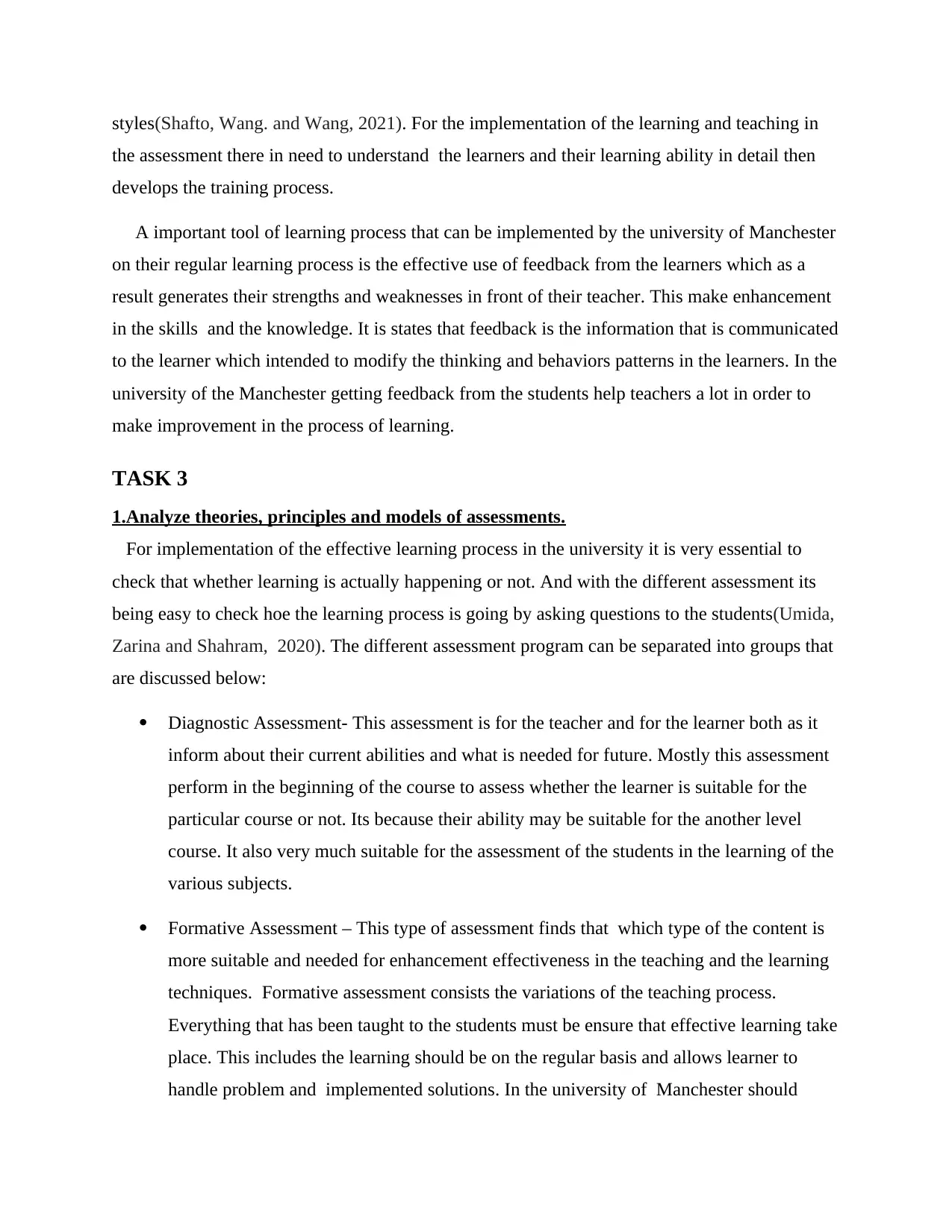
styles(Shafto, Wang. and Wang, 2021). For the implementation of the learning and teaching in
the assessment there in need to understand the learners and their learning ability in detail then
develops the training process.
A important tool of learning process that can be implemented by the university of Manchester
on their regular learning process is the effective use of feedback from the learners which as a
result generates their strengths and weaknesses in front of their teacher. This make enhancement
in the skills and the knowledge. It is states that feedback is the information that is communicated
to the learner which intended to modify the thinking and behaviors patterns in the learners. In the
university of the Manchester getting feedback from the students help teachers a lot in order to
make improvement in the process of learning.
TASK 3
1.Analyze theories, principles and models of assessments.
For implementation of the effective learning process in the university it is very essential to
check that whether learning is actually happening or not. And with the different assessment its
being easy to check hoe the learning process is going by asking questions to the students(Umida,
Zarina and Shahram, 2020). The different assessment program can be separated into groups that
are discussed below:
Diagnostic Assessment- This assessment is for the teacher and for the learner both as it
inform about their current abilities and what is needed for future. Mostly this assessment
perform in the beginning of the course to assess whether the learner is suitable for the
particular course or not. Its because their ability may be suitable for the another level
course. It also very much suitable for the assessment of the students in the learning of the
various subjects.
Formative Assessment – This type of assessment finds that which type of the content is
more suitable and needed for enhancement effectiveness in the teaching and the learning
techniques. Formative assessment consists the variations of the teaching process.
Everything that has been taught to the students must be ensure that effective learning take
place. This includes the learning should be on the regular basis and allows learner to
handle problem and implemented solutions. In the university of Manchester should
the assessment there in need to understand the learners and their learning ability in detail then
develops the training process.
A important tool of learning process that can be implemented by the university of Manchester
on their regular learning process is the effective use of feedback from the learners which as a
result generates their strengths and weaknesses in front of their teacher. This make enhancement
in the skills and the knowledge. It is states that feedback is the information that is communicated
to the learner which intended to modify the thinking and behaviors patterns in the learners. In the
university of the Manchester getting feedback from the students help teachers a lot in order to
make improvement in the process of learning.
TASK 3
1.Analyze theories, principles and models of assessments.
For implementation of the effective learning process in the university it is very essential to
check that whether learning is actually happening or not. And with the different assessment its
being easy to check hoe the learning process is going by asking questions to the students(Umida,
Zarina and Shahram, 2020). The different assessment program can be separated into groups that
are discussed below:
Diagnostic Assessment- This assessment is for the teacher and for the learner both as it
inform about their current abilities and what is needed for future. Mostly this assessment
perform in the beginning of the course to assess whether the learner is suitable for the
particular course or not. Its because their ability may be suitable for the another level
course. It also very much suitable for the assessment of the students in the learning of the
various subjects.
Formative Assessment – This type of assessment finds that which type of the content is
more suitable and needed for enhancement effectiveness in the teaching and the learning
techniques. Formative assessment consists the variations of the teaching process.
Everything that has been taught to the students must be ensure that effective learning take
place. This includes the learning should be on the regular basis and allows learner to
handle problem and implemented solutions. In the university of Manchester should
⊘ This is a preview!⊘
Do you want full access?
Subscribe today to unlock all pages.

Trusted by 1+ million students worldwide
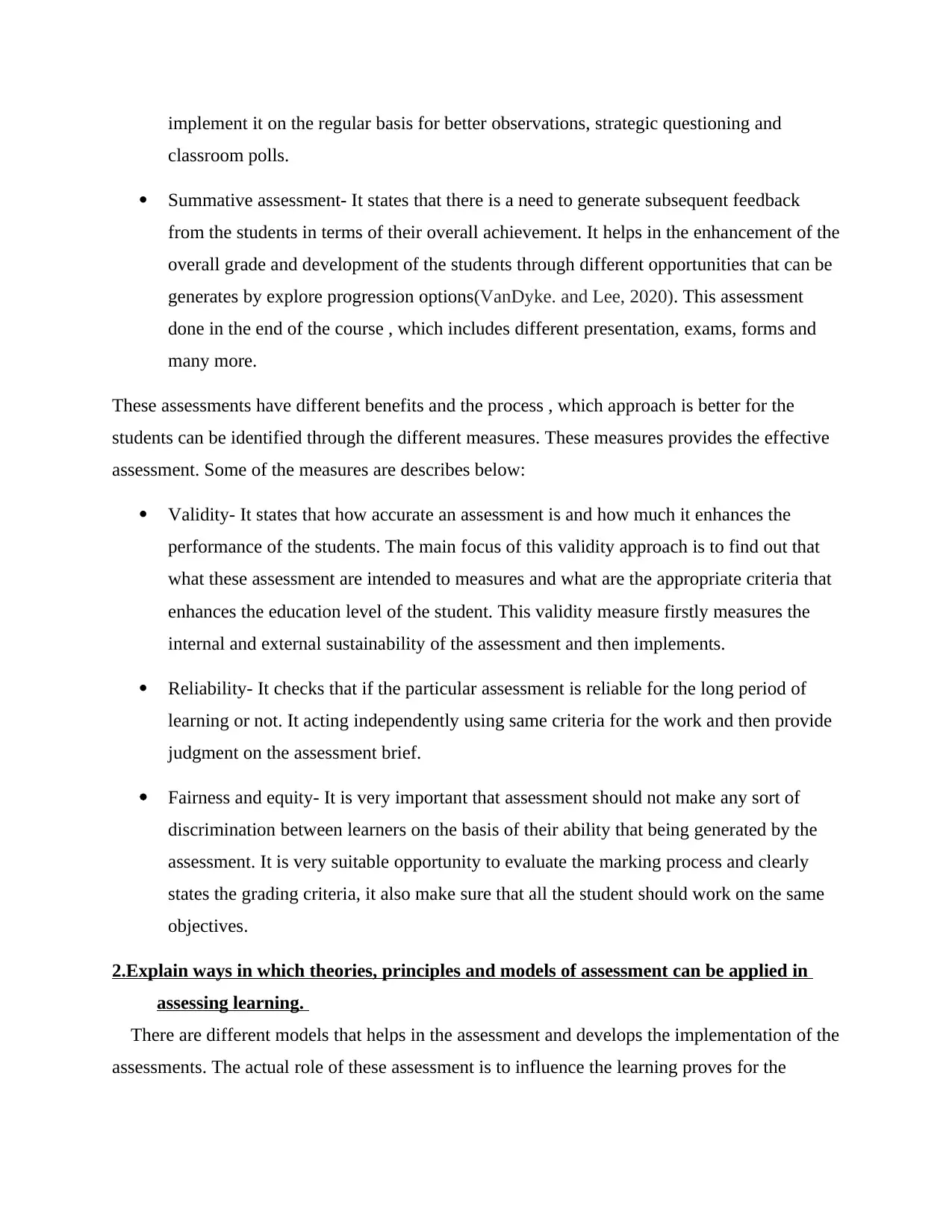
implement it on the regular basis for better observations, strategic questioning and
classroom polls.
Summative assessment- It states that there is a need to generate subsequent feedback
from the students in terms of their overall achievement. It helps in the enhancement of the
overall grade and development of the students through different opportunities that can be
generates by explore progression options(VanDyke. and Lee, 2020). This assessment
done in the end of the course , which includes different presentation, exams, forms and
many more.
These assessments have different benefits and the process , which approach is better for the
students can be identified through the different measures. These measures provides the effective
assessment. Some of the measures are describes below:
Validity- It states that how accurate an assessment is and how much it enhances the
performance of the students. The main focus of this validity approach is to find out that
what these assessment are intended to measures and what are the appropriate criteria that
enhances the education level of the student. This validity measure firstly measures the
internal and external sustainability of the assessment and then implements.
Reliability- It checks that if the particular assessment is reliable for the long period of
learning or not. It acting independently using same criteria for the work and then provide
judgment on the assessment brief.
Fairness and equity- It is very important that assessment should not make any sort of
discrimination between learners on the basis of their ability that being generated by the
assessment. It is very suitable opportunity to evaluate the marking process and clearly
states the grading criteria, it also make sure that all the student should work on the same
objectives.
2.Explain ways in which theories, principles and models of assessment can be applied in
assessing learning.
There are different models that helps in the assessment and develops the implementation of the
assessments. The actual role of these assessment is to influence the learning proves for the
classroom polls.
Summative assessment- It states that there is a need to generate subsequent feedback
from the students in terms of their overall achievement. It helps in the enhancement of the
overall grade and development of the students through different opportunities that can be
generates by explore progression options(VanDyke. and Lee, 2020). This assessment
done in the end of the course , which includes different presentation, exams, forms and
many more.
These assessments have different benefits and the process , which approach is better for the
students can be identified through the different measures. These measures provides the effective
assessment. Some of the measures are describes below:
Validity- It states that how accurate an assessment is and how much it enhances the
performance of the students. The main focus of this validity approach is to find out that
what these assessment are intended to measures and what are the appropriate criteria that
enhances the education level of the student. This validity measure firstly measures the
internal and external sustainability of the assessment and then implements.
Reliability- It checks that if the particular assessment is reliable for the long period of
learning or not. It acting independently using same criteria for the work and then provide
judgment on the assessment brief.
Fairness and equity- It is very important that assessment should not make any sort of
discrimination between learners on the basis of their ability that being generated by the
assessment. It is very suitable opportunity to evaluate the marking process and clearly
states the grading criteria, it also make sure that all the student should work on the same
objectives.
2.Explain ways in which theories, principles and models of assessment can be applied in
assessing learning.
There are different models that helps in the assessment and develops the implementation of the
assessments. The actual role of these assessment is to influence the learning proves for the
Paraphrase This Document
Need a fresh take? Get an instant paraphrase of this document with our AI Paraphraser
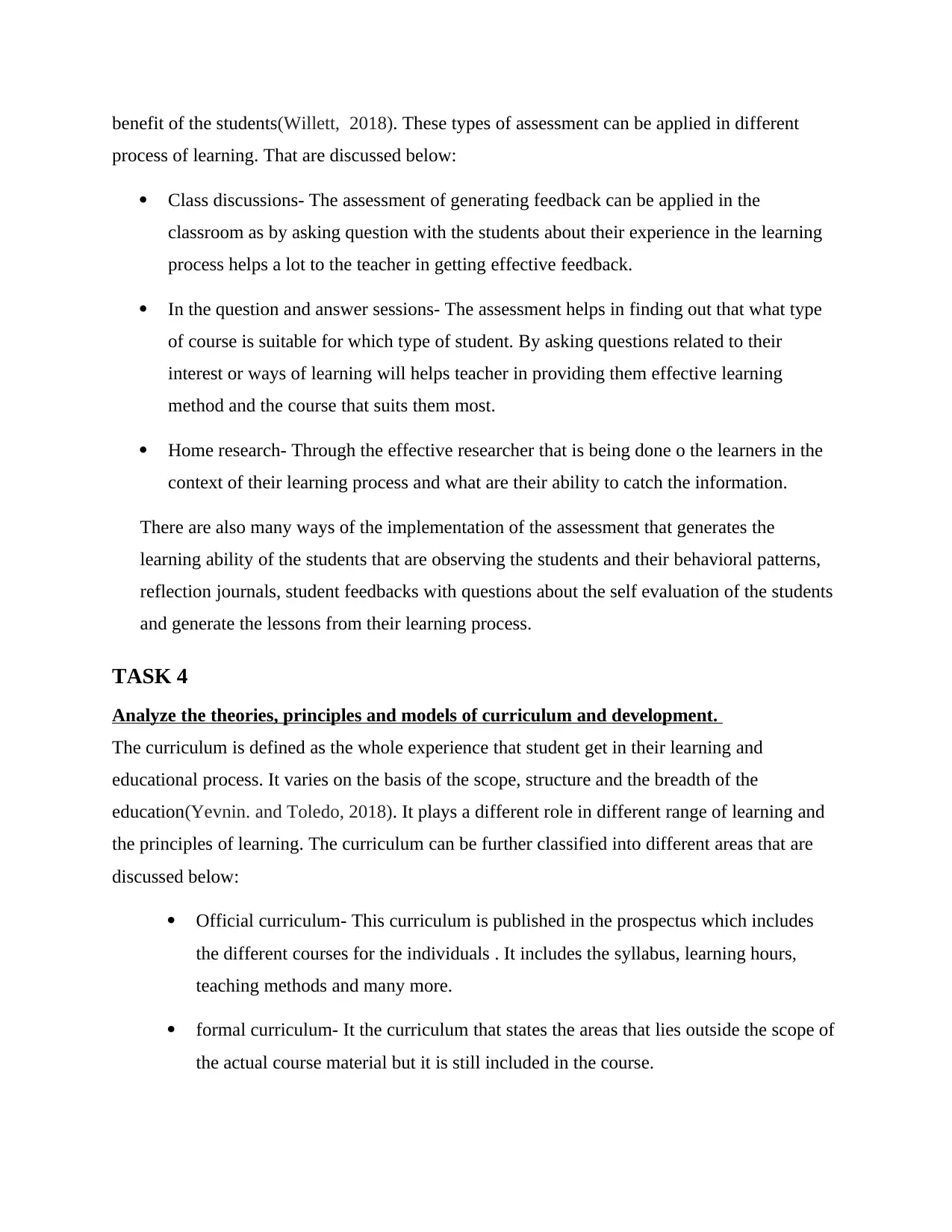
benefit of the students(Willett, 2018). These types of assessment can be applied in different
process of learning. That are discussed below:
Class discussions- The assessment of generating feedback can be applied in the
classroom as by asking question with the students about their experience in the learning
process helps a lot to the teacher in getting effective feedback.
In the question and answer sessions- The assessment helps in finding out that what type
of course is suitable for which type of student. By asking questions related to their
interest or ways of learning will helps teacher in providing them effective learning
method and the course that suits them most.
Home research- Through the effective researcher that is being done o the learners in the
context of their learning process and what are their ability to catch the information.
There are also many ways of the implementation of the assessment that generates the
learning ability of the students that are observing the students and their behavioral patterns,
reflection journals, student feedbacks with questions about the self evaluation of the students
and generate the lessons from their learning process.
TASK 4
Analyze the theories, principles and models of curriculum and development.
The curriculum is defined as the whole experience that student get in their learning and
educational process. It varies on the basis of the scope, structure and the breadth of the
education(Yevnin. and Toledo, 2018). It plays a different role in different range of learning and
the principles of learning. The curriculum can be further classified into different areas that are
discussed below:
Official curriculum- This curriculum is published in the prospectus which includes
the different courses for the individuals . It includes the syllabus, learning hours,
teaching methods and many more.
formal curriculum- It the curriculum that states the areas that lies outside the scope of
the actual course material but it is still included in the course.
process of learning. That are discussed below:
Class discussions- The assessment of generating feedback can be applied in the
classroom as by asking question with the students about their experience in the learning
process helps a lot to the teacher in getting effective feedback.
In the question and answer sessions- The assessment helps in finding out that what type
of course is suitable for which type of student. By asking questions related to their
interest or ways of learning will helps teacher in providing them effective learning
method and the course that suits them most.
Home research- Through the effective researcher that is being done o the learners in the
context of their learning process and what are their ability to catch the information.
There are also many ways of the implementation of the assessment that generates the
learning ability of the students that are observing the students and their behavioral patterns,
reflection journals, student feedbacks with questions about the self evaluation of the students
and generate the lessons from their learning process.
TASK 4
Analyze the theories, principles and models of curriculum and development.
The curriculum is defined as the whole experience that student get in their learning and
educational process. It varies on the basis of the scope, structure and the breadth of the
education(Yevnin. and Toledo, 2018). It plays a different role in different range of learning and
the principles of learning. The curriculum can be further classified into different areas that are
discussed below:
Official curriculum- This curriculum is published in the prospectus which includes
the different courses for the individuals . It includes the syllabus, learning hours,
teaching methods and many more.
formal curriculum- It the curriculum that states the areas that lies outside the scope of
the actual course material but it is still included in the course.
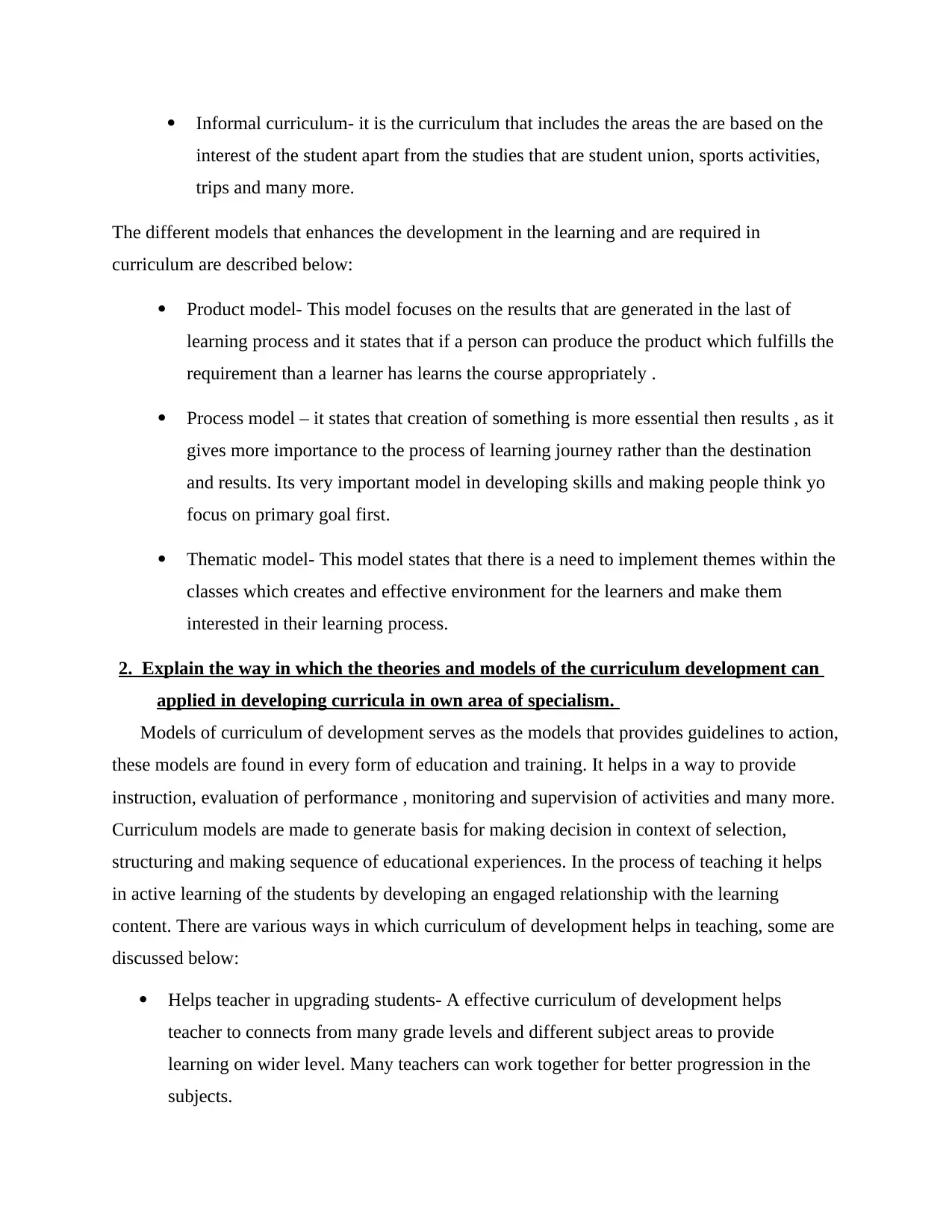
Informal curriculum- it is the curriculum that includes the areas the are based on the
interest of the student apart from the studies that are student union, sports activities,
trips and many more.
The different models that enhances the development in the learning and are required in
curriculum are described below:
Product model- This model focuses on the results that are generated in the last of
learning process and it states that if a person can produce the product which fulfills the
requirement than a learner has learns the course appropriately .
Process model – it states that creation of something is more essential then results , as it
gives more importance to the process of learning journey rather than the destination
and results. Its very important model in developing skills and making people think yo
focus on primary goal first.
Thematic model- This model states that there is a need to implement themes within the
classes which creates and effective environment for the learners and make them
interested in their learning process.
2. Explain the way in which the theories and models of the curriculum development can
applied in developing curricula in own area of specialism.
Models of curriculum of development serves as the models that provides guidelines to action,
these models are found in every form of education and training. It helps in a way to provide
instruction, evaluation of performance , monitoring and supervision of activities and many more.
Curriculum models are made to generate basis for making decision in context of selection,
structuring and making sequence of educational experiences. In the process of teaching it helps
in active learning of the students by developing an engaged relationship with the learning
content. There are various ways in which curriculum of development helps in teaching, some are
discussed below:
Helps teacher in upgrading students- A effective curriculum of development helps
teacher to connects from many grade levels and different subject areas to provide
learning on wider level. Many teachers can work together for better progression in the
subjects.
interest of the student apart from the studies that are student union, sports activities,
trips and many more.
The different models that enhances the development in the learning and are required in
curriculum are described below:
Product model- This model focuses on the results that are generated in the last of
learning process and it states that if a person can produce the product which fulfills the
requirement than a learner has learns the course appropriately .
Process model – it states that creation of something is more essential then results , as it
gives more importance to the process of learning journey rather than the destination
and results. Its very important model in developing skills and making people think yo
focus on primary goal first.
Thematic model- This model states that there is a need to implement themes within the
classes which creates and effective environment for the learners and make them
interested in their learning process.
2. Explain the way in which the theories and models of the curriculum development can
applied in developing curricula in own area of specialism.
Models of curriculum of development serves as the models that provides guidelines to action,
these models are found in every form of education and training. It helps in a way to provide
instruction, evaluation of performance , monitoring and supervision of activities and many more.
Curriculum models are made to generate basis for making decision in context of selection,
structuring and making sequence of educational experiences. In the process of teaching it helps
in active learning of the students by developing an engaged relationship with the learning
content. There are various ways in which curriculum of development helps in teaching, some are
discussed below:
Helps teacher in upgrading students- A effective curriculum of development helps
teacher to connects from many grade levels and different subject areas to provide
learning on wider level. Many teachers can work together for better progression in the
subjects.
⊘ This is a preview!⊘
Do you want full access?
Subscribe today to unlock all pages.

Trusted by 1+ million students worldwide
1 out of 17
Related Documents
Your All-in-One AI-Powered Toolkit for Academic Success.
+13062052269
info@desklib.com
Available 24*7 on WhatsApp / Email
![[object Object]](/_next/static/media/star-bottom.7253800d.svg)
Unlock your academic potential
Copyright © 2020–2026 A2Z Services. All Rights Reserved. Developed and managed by ZUCOL.

